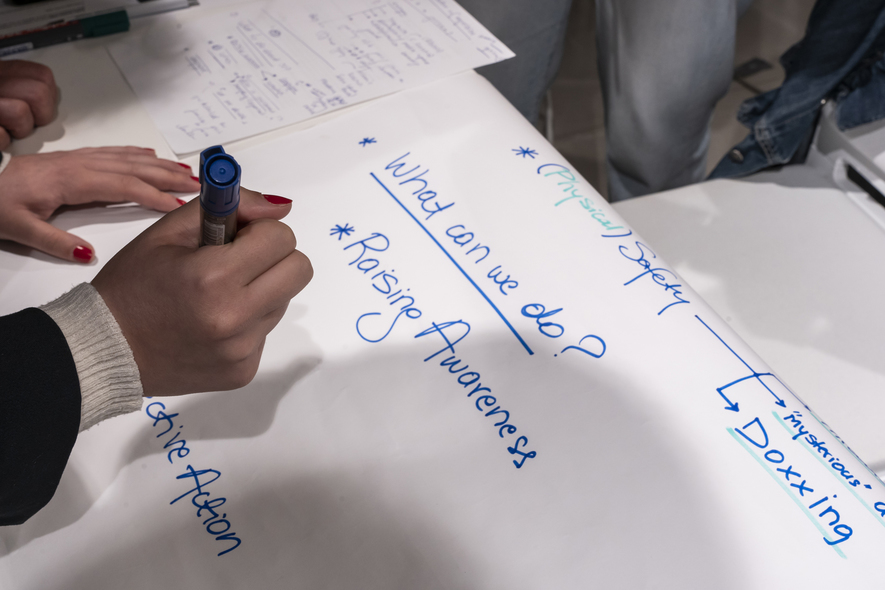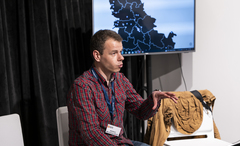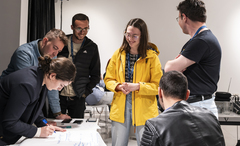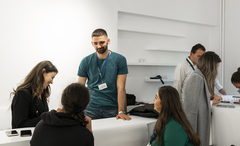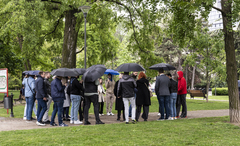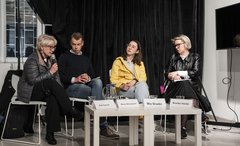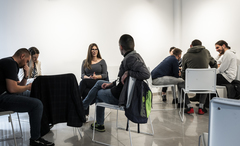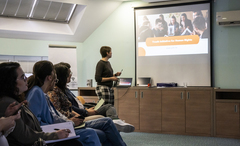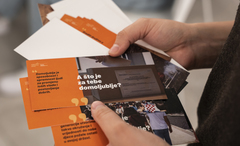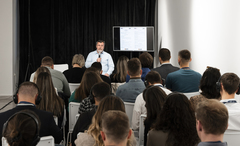From May 10th to 13th, Belgrade became the vibrant hub that gathered young politicians and activists from eight countries of the Western Balkans!
The conference 'Reconciling the Past, Building the Future' had a total of 46 participants, most of whom came as delegates representing youth wings of political parties, but there were also young activists involved in various non-governmental organizations dealing with minority protection and the promotion of human rights.
The first day of the conference was dedicated to the arrival of participants from Ljubljana, Podgorica, Pristina, Sarajevo, Skopje, and Zagreb to Belgrade, where they had their first evening meeting with the organizers and local young participants.
The second day of the conference was filled with various activities. The morning program started with a guest appearance by Veran Matić, the special envoy of the President of Serbia for addressing the issue of missing persons. He shared his efforts and contributions to regional cooperation and reconciliation through his work. As a journalist, he also discussed media freedom, the killings of several journalists in Serbia, and the struggle for uncovering the truth regarding these tragic events.
The planned outdoor activity for the afternoon, the “Memory walk – Hidden Political History of Belgrade,” unfortunately couldn’t be completed due to bad weather. Upon returning to the Endžio HAB, where the majority of the conference sessions were held, guide Marko Milosavljević from YIHR Serbia continued to highlight important events associated with the anti-war rallies that took place on the streets of Belgrade in the early 1990s, accompanied by video footages from that time.
The last program activity of that day was a workshop on human rights. Participants were split into six mixed groups made up of activists and politicians from different countries. During the workshop, participants shared the human rights issues they recognize in their countries and the region, and then collectively chose one issue to come up with a solution for. The chosen topics of the groups were: Roma inclusion in society, LGBTIQ+ rights, promotion of the right to democratic action, women’s rights, freedom of expression and media freedom, and language rights of minority members. Each group could approach problem-solving from either a political or activist perspective. Interestingly, three groups ultimately opted for an activist approach, while the remaining three chose a political approach. At the end of the workshop all groups presented their proposed solutions for the identified problems.
The optional gathering that was held after dinner and was accompanied by watching the second semi-final night of the Eurovision contest gathered a large number of participants.
The following day featured two parallel activities. In the conference room of the hotel where the participants were accommodated, the annual assembly of the Political Youth Network (PYN) took place. The assembly was chaired by Dorotea Strelec, the program coordinator from the Youth Initiative for Human Rights Croatia. Thirteen delegates from PYN member organizations, two delegates from prospective members from North Macedonia representing the political party Democrats and the youth wing of the Liberal Democratic Party, one delegate from a prospective member from Croatia representing the Istrian Democratic Youth, who joined via Zoom, and two guest delegates from youth wings expressing interest in joining PYN in the future, attended the assembly. Initially, the work of the Youth Initiative for Human Rights was presented to the young politicians, followed by the annual report on the work of the Political Youth Network. Then, three delegates from prospective member organizations presented the work of their respective organizations. In the second half of the assembly, inactive members were discussed, with whom the secretariat will try to get in touch with the help of delegates who offered to send their contacts, and upcoming activities within PYN, as well as potential guest appearances and topics of interest to young politicians, were discussed.
At the same time, young activists attended a guest lecture in Endžio HAB held by colleagues Borislav Prodanović, Ozren Lazić, and Laura Pejak from the Novi Sad Youth Center CK13, who delivered a lecture on the topic “Everyday is political.” During their lecture, the colleagues referred to the unfortunate events that shook both Serbia and the entire region a week before the conference, urging participants to reflect on the violence they witness in their daily lives and propose ways to combat societal violence, from individual actions to civil society engagement and responses from the states. They also presented alternative policies related to their work, including civic self-organization, feminism, environmentalism, and economic alternatives.
After lunch, two more activities followed. The first was a workshop aimed at educating participants about the difference between nationalism and patriotism. After discussions on the topic in small groups and sharing their responses with everyone present, participants individually offered their own understanding of patriotism in written form.
The evening session was a panel titled “Civil Disobedience vs Institutional Resistance for Positive Social Change – YIHR Talks,” featuring long-time peace activist and politically engaged Aida Ćorović, activist Marko Milosavljević, who focuses on advocacy toward institutions responsible for protecting human rights through his work in the Youth Initiative for Human Rights Serbia, and activist Mia Bradić, a member of the younger generation who is committed to activism related to environmental issues and feminism. The conversation was moderated by Branka Vierda, the program director of the Youth Initiative for Human Rights Croatia. Young audience members highlighted during the Q&A about how this panel in particular encouraged them for their future political and activist endeavors.
On the last day of the program, participants filled out online evaluations and then shared their impressions of participating in the conference orally. Some of them mentioned that thanks to their application for this event, they had the opportunity to visit Belgrade for the first time, even though they come from neighboring countries. Almost all of them mentioned gaining new useful knowledge through the program activities, but also learning a lot through networking and peer to peer discussions with each other.
(Photo author: Sanja Bistričić Srića)
